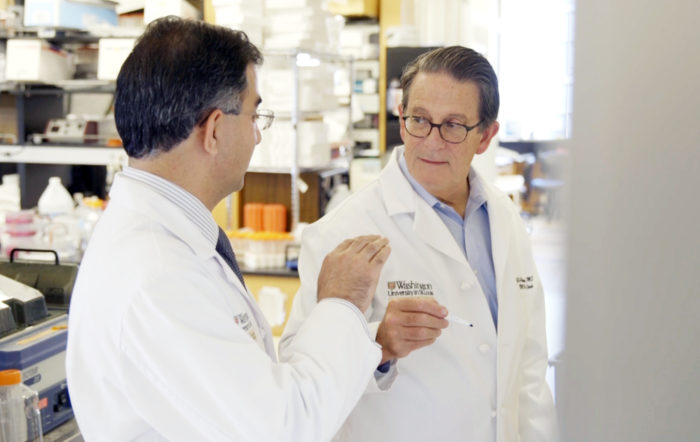$6 million supports leukemia research
DiPersio receives NCI outstanding investigator award
 Huy Mach
Huy MachJohn DiPersio, MD, PhD, (right) has received an outstanding investigator award from the National Cancer Institute to support his work to improve therapies for leukemia and other blood cancers. DiPersio speaks with fellow oncologist Armin Ghobadi, MD, about CAR-T cell therapy, a recently approved treatment option for some types of non-Hodgkin lymphoma that DiPersio and his colleagues are working to improve upon.
John F. DiPersio, MD, PhD, of Washington University School of Medicine in St. Louis, has received a $6 million outstanding investigator award from the National Cancer Institute (NCI) of the National Institutes of Health (NIH) to support research aimed at improving therapies for leukemia.
DiPersio, the Virginia E. and Sam J. Golman Professor of Medicine in Oncology, is also deputy director of Siteman Cancer Center at Barnes-Jewish Hospital and Washington University School of Medicine. He is a leading expert in understanding and treating leukemia, a cancer of the blood-forming cells in the bone marrow. Along with chemotherapy, the standard of care for leukemia is a stem cell transplant, commonly referred to as a bone marrow transplant.
“One of our major goals is to optimize stem cell transplantation — both in making the process of donating stem cells faster and more efficient and in finding ways to control the potentially damaging side effects of the transplant,” DiPersio said. “A stem cell transplant is often the only curative therapy for these types of blood cancers. But the transplant itself can be life-threatening if the donor’s stem cells begin to attack the patient’s vital organs. If we can control and prevent these side effects, it could have a significant impact on patients.”
The NCI’s outstanding investigator award recognizes physician-scientists who have a long history of successful research and are deemed likely to make major gains in the cancer field with the support of continuous funding for seven years.
The grant will support three major areas of research in DiPersio’s lab. One area is focused on improving the effectiveness of standard chemotherapy and in making stem cell donation faster and more efficient. DiPersio and Michael P. Rettig, PhD, an associate professor of medicine, are seeking better ways to force cancerous cells that hide in the bone marrow to move into the bloodstream, where they are more vulnerable to chemotherapy. In addition, boosting this movement of blood stem cells also helps speed the process of harvesting healthy stem cells from a donor, for use in a stem cell transplant. Today, that process can take up to two weeks. DiPersio said he and his colleagues are testing strategies that have the potential to reduce the time to minutes or hours.
A second area of focus for DiPersio’s lab is to prevent graft-versus-host disease, a major and sometimes life-threatening complication of bone marrow transplantation. Graft-versus-host disease occurs when the donor immune cells that kill cancer begin inadvertently to attack a patient’s organs. Researchers in DiPersio’s lab, led by Jaebok Choi, PhD, an assistant professor of medicine, are investigating a class of drugs called JAK inhibitors — approved by the Food and Drug Administration to treat rheumatoid arthritis. These drugs have been shown in animal models and in small clinical trials to reduce graft-versus-host disease while maintaining the anti-cancerous effect against the leukemia.
A third area of focus is to develop new immunotherapies to treat acute myeloid leukemia (AML), T-cell acute lymphoblastic leukemia (T-ALL) and T-cell non-Hodgkin lymphoma (T-NHL). The grant will support developing antibodies and engineered T cells, called CAR-T cells, capable of targeting multiple proteins on AML, T-ALL and T- NHL. Also, to pursue targeted therapies for T-ALL, the grant will support the use of CRISPR gene-editing technology to design T-cells that can attack cancer without harming healthy cells.
“Tumor cells make proteins that distinguish these cells from healthy cells,” DiPersio said. “We can now genetically program immune cells to target these proteins, taking what an immune cell does normally, every day, to protect us from infection and directing it at a specific type of cancerous cell. It’s a bit like giving a dog a scent. You’re telling the immune cells what to look for, sensitizing them to the target.”
In this approach, the gene-editing technology also is used to remove the cellular machinery that triggers graft-versus-host disease while still allowing these genetically edited CAR-T cells to track down and kill the T-ALL cells. Using this approach, the DiPersio lab will be able to use T-cells obtained from any donor without relying on the patient’s own T cells, which are “sick” and hard to separate from the patient’s malignant T-ALL, among other challenges.
DiPersio’s novel approach has been dubbed “off-the-shelf” CAR-T cell therapy because the T-cells could be donated by anyone and prepared ahead of time. This is in contrast to a traditional stem cell transplant, in which the potential donors are restricted to a patient’s close relatives or a person with similar immune characteristics. Efforts in this third research area are led by Matthew L. Cooper, PhD, an instructor in medicine.
In addition to his research program, DiPersio also directs the Division of Oncology at the School of Medicine and was the founding director of the adult bone marrow and stem cell transplant program, which he led for many years. One of the largest such programs worldwide, it currently is led by Peter Westervelt, MD, PhD, a professor of medicine. The program performs almost 500 transplants per year and recently performed its 7,500th transplant.






